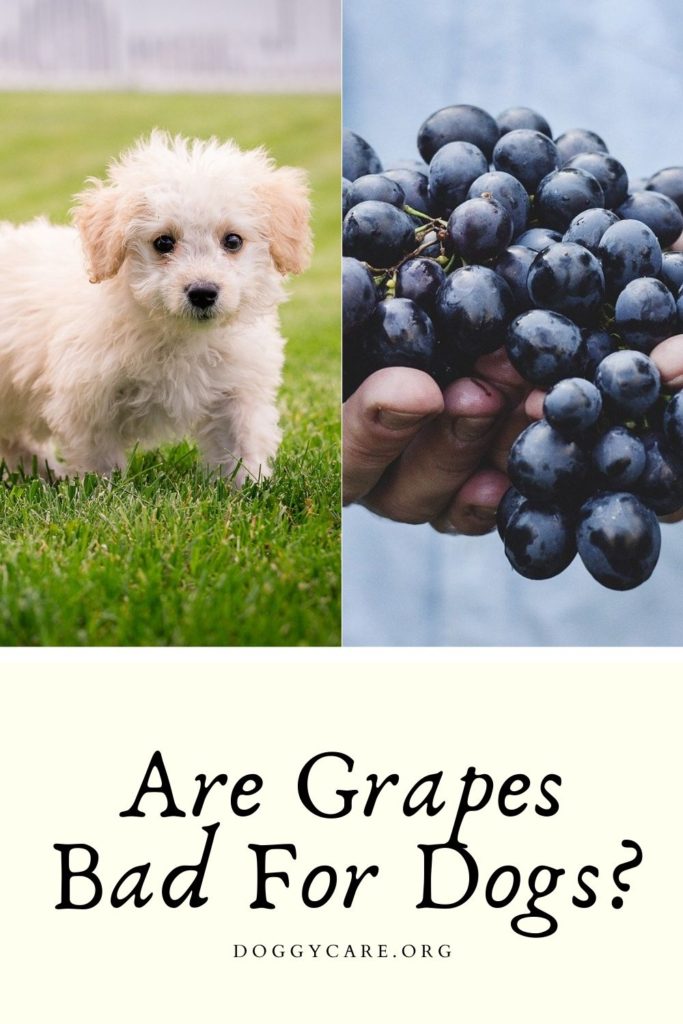- You are here:
- Home »
- Dog Food
- » Are Grapes Bad For Dogs?
Are Grapes Bad For Dogs?

We love our dogs as much as we love ourselves. Their diets are important for proper development, growth, and having a long life to live. With that said, making sure your dog avoid toxic fruits and vegetables will require a significant amount of knowledge and understanding from many dog owners or soon-to-be dog owners.
Are grapes bad for dogs to eat?
Most of us enjoy a juicy grape or a dried out one every now and then. When the weather is blazing hot and there’s not much to do, a simple grape with other foods help cool us down to enjoy a more delightful day or night. For our furry friends, feeding them a grape or raisin isn’t something we would recommend.
Why are grapes bad for dogs?
Some researchers are unsure the exact contents that triggers fatal kidney failure in dogs. It is said that grapes contains mycotoxin and salicylate, which can cause decreased blood flow to the kidneys, hyperthermia, and tremors. With advanced technology and increased awareness, science is continuing to work towards breaking the code behind the toxicity within grapes.
How are grapes toxic to dogs?
Even though grapes are everyone’s go to snack, dogs shouldn’t lock their eyes on your bag filled with those tiny juicy delights. If your dog enjoy consuming grapes or raisins, then he/she will experience grape poisoning. Symptoms and side effects include:
- Unconsciousness
- Not being able to breathe comfortably and easily
- Dehydration
- Seizures or intense tremors (shaking as if he/she was stuck outside in the snow)
- Acute kidney failure due to no blood flow towards the kidneys
- Lack of appetite
- Nausea/Vomiting
- Abdominal pain
- Frequent urination
What should I do if the poisoning progresses?
For sure your dog’s kidneys will shut down, causing serious difficulty to produce urine. In addition to the trouble of producing urine, he/she will also experience vomiting within 24 hours after consumption. If you suspect your dog consumed grapes, immediately reach out and take your dog to the vet clinic. They may suggest immediate induced vomiting, however, this shouldn’t take place if your dog cannot breathe.
Alternative fruits to feed dogs instead of grapes.
Is it possible to feed your dog other fruits outside of grapes? Of course! There are plenty of fruits that are safe to feed to your dog and fun to share together. Also, you can use these naturally sweet goodies as a training or obedience treat (not to mention making it cheaper to purchase instead of buying dry ole doggie treats).
Cranberries
Unlike grapes and raisins, cranberries and dried cranberries is a great alternative to feed your dog as a snack or a training treat. Cranberries contains large levels of antioxidants, promoting his/hers immune system and reducing the possibilities of inflammation. Also, cranberry juice is good (in moderation) if you suspect your dog dealing with a urinary tract infection (UTI). Those things are not fun to deal with!
Oranges
Dogs can consume oranges, but in small slices. The orange contains potassium and some fiber, while remaining significantly low in sodium. Be mindful of feeding dogs oranges if your dog is overweight, because it contains sugar which can add on crazy calories.
Watermelons
Packed with nutritional vitamins, like A, B6. and C, with some good ole potassium, watermelons are one of natures sweetest treats to give to your dog. The fruit itself contains a lot of water, encouraging hydration with little risk of consuming too much sugar. Plus, it contains healthy electrolytes to restore in your dog’s system for when he/she loses it from the sun. Make sure you take out the seeds in the watermelon and avoid feeding your dog the rind, which can cause digestive problems.
Conclusion
Taking care of a dog is a huge responsibility for many owners. It isn’t every day that your dog grows curious and develop a craving for human foodie delight. There are other fruits that your dog can consume to keep a happy tummy and a healthy body without disturbing his/hers established diet you’ve set for them. Even outside of fruits and vegetables, keeping a careful eye on your dogs health will not only save you money and extra vet trips in the future, but also allows you to build a stronger connection to your dog and their eating habits.